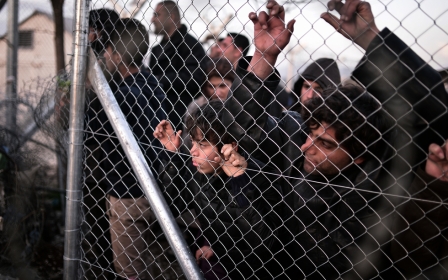EU agrees deal to forcibly return asylum seekers to Turkey

EU and Turkish officials have agreed a deal that will see hundreds of thousands of asylum seekers returned to Turkey in exchange for accelerated accession to the EU after hours of crunch talks in Brussels on Friday.
Asylum seekers will begin being forcibly returned from Europe to Turkey from 20 March, a spokesperson for European Council chief Donald Tusk told Sky News.
All 28 EU member states have agreed to the terms of the final deal set out by Tusk, an EU official told the Financial Times.
The exact terms of the deal have not been made public.
The announcement follows tense negotiations between officials hoping to clinch a deal to tackle the continent's worst refugee crisis since World War II.
In the early hours of Friday morning European leaders finally agreed on a common position to put to Turkey's prime minister over a breakfast meeting in Brussels later in the day.
The 28 states spent the day haggling over the proposal, under which Turkey would take all refugees and migrants from Greece, helping curb an unprecedented influx of 1.2 million people from Syria and elsewhere since 2015.
A senior EU official said it was "not a deal but a common position" to allow negotiations on a final text with the Turkish premier.
But the deal comes at a heavy price for the EU including an acceleration of Turkey's long-stalled bid for membership of the union, billions of euros in extra aid and visa-free travel, amid deep concerns over Ankara's human rights record.
Hours into the talks, an EU official told AFP correspondent Danny Kemp that "serious sticking points" remained: the legality of the deal, which some member states have questioned, EU accession and how the deal will be funded.
As he boarded a Brussels-bound plane in Ankara on Friday morning, Turkish Prime Minister Ahmet Davutoglu had described the proposed deal as "clear and honest" but added: "Turkey will never become an open prison for migrants."
Doctors Without Borders, which provides health services for people injured during the risky Aegean Sea crossing to Europe, has strongly condemned the deal as "ugly and illegal".
'Edge of international law'
The refugee crisis has left Europe increasingly divided, with fears that its Schengen passport-free zone could collapse as states reintroduce border controls and concerns over the rise of populist parties on anti-immigration sentiment.
European leaders voiced caution about whether they can finally seal the deal with Turkey, which has been trying to join the EU for decades.
Tusk said earlier he was "cautiously optimistic but frankly, more cautious than optimistic" while German Chancellor Angela Merkel warned there were "many things to resolve".
Other EU leaders voiced worries that the deal - under which the EU would take in one Syrian refugee from Turkish soil in exchange for every Syrian taken back by Turkey from Greece - would be illegal.
The aim of the "one-for-one" deal is allegedly to encourage Syrians to apply for asylum in the EU while they are still on Turkish soil, instead of taking dangerous smugglers' boats across the Aegean Sea.
Lithuanian President Dalia Grybauskaite said the plan was "very complicated, will be very difficult to implement and is on the edge of international law".
Belgian premier Charles Michel evoked concerns over Turkey's rights record and its conflict with Kurdish separatists, adding: "I can't accept negotiations which sometimes look like they are a form of blackmail."
Over dinner, Tusk presented changes to the deal such as a mention that the UNHCR must be involved in deporting people, that women and children should form the bulk of those taken under the "one-for-one" scheme and that all asylum applications must be dealt with individually, EU officials said.
The new draft also mentioned that an additional three billion euros in aid for refugees in Turkey would be conditional on the initial three billion euros from the November deal with Ankara being spent first.
Cyprus problem
One major hurdle that appeared to have been overcome was opposition from Cyprus, rooted in its long-standing tensions with Turkey over Ankara's refusal to recognise its government on the divided island.
Cypriot President Nicos Anastasiades indicated he could be ready to "compromise" on his objections to the EU opening new "chapters" in Turkey's accession process after earlier threatening to block the entire deal.
The deal also envisages major aid for Greece, where tens of thousands of refugees are trapped in dire conditions after Balkan countries shut their borders to stop them heading north to richer Germany and Scandinavia.
It says the EU will also help it deal with the huge logistical burden of ensuring asylum seekers on the Greek islands are registered and processed before being returned to Turkey.
Jolie and Ai Wewei at Idomeni
Highlighting global attention on the issue, Hollywood star and UNHCR goodwill ambassador Angelina Jolie on Thursday visited the island of Lesbos, the principal port of entry for migrants to Europe.
Meanwhile in the bleak camp of Idomeni on the Macedonian-Greek border, Chinese dissident artist Ai Weiwei on Thursday had his hair cut by a migrant barber to draw attention to their plight.
Stay informed with MEE's newsletters
Sign up to get the latest alerts, insights and analysis, starting with Turkey Unpacked
Middle East Eye delivers independent and unrivalled coverage and analysis of the Middle East, North Africa and beyond. To learn more about republishing this content and the associated fees, please fill out this form. More about MEE can be found here.




